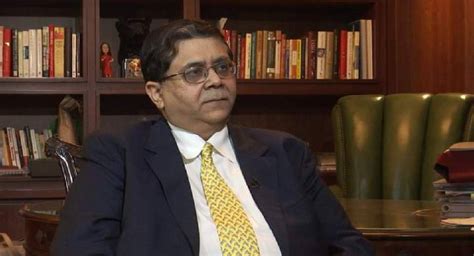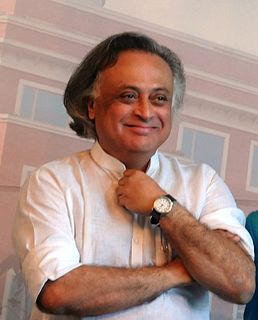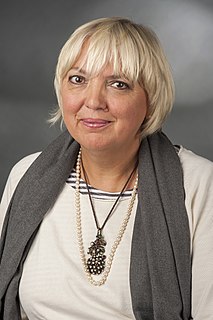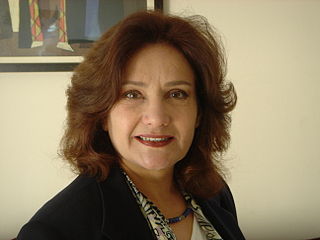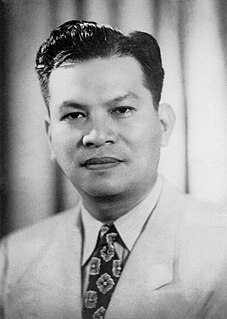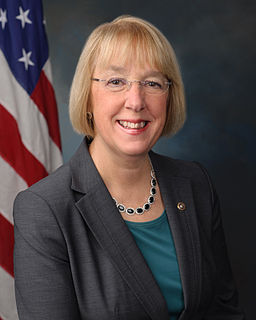Top 1200 Foreign Countries Quotes & Sayings - Page 14
Explore popular Foreign Countries quotes.
Last updated on December 22, 2024.
When you ban people from predominantly Muslim countries from coming into the U.S., even people who accompanied our soldiers and helped them on the battlefield, but you say, "But, of course, there's gonna be an exception if you're a religious minority," - OK, so that means Christians, there will be a different rule applied to Christians from these countries than others - that's a religious test. And that is completely contrary to our national traditions.
This pride of race is a quality which the German, fundamentally, does not possess. The reason for this is that for these last three centuries the country has been torn by internal dissension and religious wars and has been subjected to a variety of foreign influences, to the influence, for example, of Christianity-for Christianity is not a natural religion for the Germans, but a religion that has been imported and which strikes no responsive chord in their hearts and is foreign to the inherent genius of the race. (13th February 1945)
If one looks at the history of India after independence in 1947, for the first 30 to 40 years I think we were effectively given up as a basket case because we made various attempts through socialism to effectively alleviate poverty and keep growing but that model didn't work. So even when the pre-90s when we spoke to foreign corporation of foreign businessmen who wanted to do business with us, we were always a land of opportunity but an opportunity whose time have not yet come.
We are fighting so that insults may no longer rule our countries, martyred and scorned for centuries, so that our peoples may never more be exploited by imperialists not only by people with white skin, because we do not confuse exploitation or exploiters with the colour of men's skins; we do not want any exploitation in our countries, not even by black people.
Currently, the United States has troops in dozens of countries and is actively fighting in Iraq, Syria, Libya, and Yemen (with the occasional drone strike in Pakistan). In addition, the United States is pledged to defend 28 countries in NATO. It is unwise to expand the monetary and military obligations of the United States given the burden of our $20 trillion debt.
Countries that work with Europe should feel safer than they would if they worked with non-democratic regimes. Why isn't Europe building infrastructure in Africa instead of leaving it to the Chinese? Why haven't we succeeded in promoting the economic development of our neighbors in the Balkans, instead conceding these countries to growing Russian influence? In an uncomfortable world, we Europeans can no longer sit back and wait for the U.S.A.
China's accumulation of reserves is a result of the IMF's mismanagement of the Asian financial crisis a decade or so ago. If countries know they can't rely on the IMF to help them, their best defense is their own reserve cushion. In a time of spreading global recession, too much emphasis on savings in surplus countries like China can impede prospects for global growth.
It was good to launch the economy in the '50s. Japan did this; China did this; even South Korea did this. All the East Asians did this - import substitution. I think all countries followed import substitution in the '50s and in the '60s, but I think by the '70s, countries were getting out of that first phase of the strategy.
The UN should arrange, as US forces leave, for an international group of peacekeepers and negotiators from the Arab countries to bring together Shiites, Sunnis and Kurds, and work out a solution for self-governance that would give all three groups a share in political power. Simultaneously, the UN should arrange for shipments of food and medicine, from the United States and other countries, as well as engineers to help rebuild the country.
The typical big Japanese company has somewhere between a third and 40 percent of its revenues coming from developing countries, and about a third of Japan's exports are also to the emerging countries, so in a strange way, Japan, which has very little internal growth, its big companies are a good way to play the emerging markets.
My reading of the threat from Iran is that if Iran acquires nuclear weapons, it is an existential threat to the State of Israel and to other countries in the region because the other countries in the region will feel compelling requirement to acquire nuclear weapons as well. Now we cannot a second Holocaust.
The difference in the quality of medical care received by people with mental illness is one of the reasons why they live shorter lives than people without mental illness. Even in the best-resourced countries in the world, this life expectancy gap is as much as 20 years. In the developing countries of the world, this gap is even larger.
We, the Greens, should thank our former foreign minister Joschka Fischer for bringing something hideous and shameful to light - that Nazi ideas were fully adopted by white-collar workers in the Foreign Ministry. Joschka Fischer stood up to criticism that he would foul his own nest, and with his order to start the historical commission he made it clear that the ministry's pride in itself, as a haven of resistance to Hitler, was no longer acceptable.
Colombia was a big wheat producer in the 1950's. That was eliminated by what sounds like a nice plan, called "Food for Peace. " It's a plan by which US taxpayers subsidized US agribusiness to send food to poor countries. This, of course, destroyed the domestic agricultural markets of these countries, opening these markets to US agribusiness.
We Marxists believe that a revolution will also take place in other countries. But it will take place only when the revolutionaries in those countries think it possible, or necessary. The export of revolution is nonsense. Every country will make its own revolution if it wants to, and if it does not want to, there will be no revolution.
Geoffrey's personal style was very different from mine. He has a lovely speaking voice, a quiet speaking voice. But at Cabinet we always reported on foreign affairs - we always had this quiet voice. It was so quiet sometimes I had to say 'speak up'. And he gave it in a way which wasn't exactly scintillating. And you know, foreign affairs are interesting. They affect everything that happened to our own way of life, and they are exciting. And so we just diverged.
I am familiar with what goes on in the Arab countries, and I'm sad to say that most of us want to annihilate Israel. We want to kill all the Israelis... Do you know what they used to say in the mosques in Egypt? "We want to go to the White House and turn it into the Islamic House..." We call upon the Arab countries to stop teaching hatred to the Arab children.
Barack Obama has been stronger on the Ukraine than all the other countries put together, and those other countries right next door to the Ukraine. I don't think we're treated fair.We're constantly, you know, sending our ships, sending our planes, doing our war games, doing other. We're reimbursed a fraction of what this is all costing.
When I first signed up for a Twitter account - I was to say it was in 2007, people are going to think it's some weird self promotional thing or it's going, but in time I was called upon to like try to persuade other foreign correspondents and journalists to get on Twitter and see the usefulness of it which is kind of ironic. I think the journalists who are leading the digital charge at the Times have, all have that background as a foreign correspondent, which I think is not accidental.
During the 1960s, and again in the 1970s, growth in manufacturing productivity in the United Kingdom was the lowest of all the seven major industrial countries in the world. During the 1980s, our annual rate of growth of output per head in manufacturing has been the highest of all the seven major industrial countries.
The simple fact is that the world is not paying for the services the forests provide. At the moment, they are worth more dead than alive-for soya, for beef, for palm oil and for logging, feeding the demand from other countries. ... I think we need to be clear that the drivers of rainforest destruction do not originate in the rainforest nations, but in the more developed countries which, unwittingly or not, have caused climate change.
I am now-the friend of the equal rights of men, of representative democracy, of republicanism and the Declaration of Independence, the great charter of our national rights; and of course the friend of the indissoluble union and Constitution of the states. I am the enemy of all foreign influence, for all foreign influence is the influence of tyranny. This is the only chosen spot of liberty-this is the only republic on earth." "Live Free Or Die; Death Is Not The Worst Of Evils.
People who believe in 'universal health care' show remarkably little interest - usually none - in finding out what that phrase turns out to mean in practice, in those countries where it already exists, such as Britain, Sweden or Canada. For one thing, 'universal health care' in these countries means months of waiting for surgery that Americans get in a matter of weeks or even days.
There's a tradeoff. Yeah, I lose the deduction that I really like, but my tax rate is going to go down, and I don't have to fill out that form anymore. It's much simpler, rates are lower, and that tradeoff has worked in many countries. Many countries have just cleaned house of all those exemptions in order to provide lower rates, and people buy it.
I agree with Peter Drucker that the culture and legal systems of the United Statesare especially favorable to shareholder interests, compared to other interests and compared to most other countries. Indeed, there are many other countries where any good going to public shareholders has a very low priority and almost every other constituency stands higher in line.
Countries will cooperate with each other, and are more likely to cooperate with each other when they share a common culture, as is most dramatically illustrated in the European Union. But other groupings of countries are emerging in East Asia and in South America. Basically, as I said, these politics will be oriented around, in large part, cultural similarities and cultural antagonism.
The indigenous peoples of the great tourist spots seem to lose their souls. All cultural, religious, and political efforts and ideals are crippled since the culture is engaged only in luring ever more tourists. It is not the contact with an essentially foreign population that corrupts the inhabitants of the great foreign resorts. It is the contact with great masses of people who are seeking fir the moment only well-being and not salvation that weakens and devalues the indigenous population.
The rich and powerful countries are trying to wreck as much as possible. You know, go off the cliff as soon as you can. Extract every drop of hydrocarbons off the ground and destroy the environment. At the opposite extreme are countries like Bolivia and Ecuador, indigenous people around the world, and first nations in Canada and tribal people in India, campesinos in Colombia... They're trying to save the commons.
If I just think of the churches in my little town here because I've been to every one of them, there are 27, there aren't that many where you walk in and say wow, people are excited about their faith. A lot of them, it's just what you do on Sunday at 10:00 or 11:00 and that's not true in other countries. In some other countries, it's still a very lively, vibrant experience.
Accepting Turkey as a member of the European club means that the club is open to outsiders, to Muslims, to poorer people, to developing countries, to countries with a slightly different cultural tradition but basically the same values. I think it's dangerous for the West to close the door; it doesn't do us any good and it doesn't do the rest of the world any good. Also, it reduces the danger of a "clash of civilizations".
Just between you and me, shouldn’t the World Bank be encouraging MORE migration of the dirty industries to the LDCs [Less Developed Countries]?... I think the economic logic behind dumping a load of toxic waste in the lowest wage country is impeccable and we should face up to that... I’ve always though that under-populated countries in Africa are vastly UNDER-polluted, their air quality is probably vastly inefficiently low compared to Los Angeles or Mexico City.
In Germany, many other countries, college tuition is free. Why isn`t free in America? Why do we have the highest rate of childhood poverty when other countries have rates much lower than we have? Why don`t we have pay equity for women workers? Why aren`t we leading the world in transforming our energy system in terms of climate change? We can do that. Are we dumb? Are we lazy? Not the case.
Women in the Arab world have a rich history in their active participation in political change from the Algeria revolution against the French occupation to the most recent revolution in Tunisia, Egypt, Libya among other countries. The question is not their participation. Their question is the incorporation of women's voices fully in the new definitions of the countries where change has happened.
The Daily Telegraph reported on April 9, 1937: 'Since M. Litvinoff ousted Chicherin, no Russian has ever held a high post in the Commissariat for Foreign Affairs.' It seems that the Daily Telegraph was unaware that Chicherin's mother was a Jewess. The Russian Molotov, who became Foreign Minister later, has a Jewish wife, and one of his two assistants is the Jew, Lozovsky. It was the last-named who renewed the treaty with Japan in 1942, by which the Kamchatka fisheries provided the Japanese with an essential part of their food supplies.
Which countries contain the most peaceful, the most moral, and the happiest people? Those people are found in the countries where the law least interferes with private affairs; where the government is least felt; where the individual has the greatest scope, and free opinion the greatest influence; where the administrative powers are fewest and simplest; where taxes are lightest and most nearly equal
Up here in Alaska we're sitting on billions of barrels of oil. We're sitting on hundreds of trillions of cubic feet of natural gas onshore and offshore. And it seems to be only the Republicans who understand that companies should be competing for the right to tap those resources, and get that energy source flowing into these hungry markets so that we will be less reliant on foreign sources of energy. In a volatile world, relying on foreign regimes that are not friendly to Americans, asking them to ramp up resource production for our benefit, that's nonsensical.
It's true that we in Iraq are now paying a heavy price as a consequence of senseless violence, but nonetheless there are many positive things happening generally on the part of people in Arab countries who were living in darkness and absolute silence because of dictatorship. The people in Arab countries are now speaking out and asking many questions about human rights, minorities, religion, democracy, "the other," and so on.
I see,... and with the deepest affliction, the rapid strides with which the federal branch of our government is advancing towards the usurpation of all the rights reserved to the States, and the consolidation in itself of all powers, foreign and domestic; and that, too, by constructions which, if legitimate, leave no limits to their power... It is but too evident that the three ruling branches of [the Federal government] are in combination to strip their colleagues, the State authorities, of the powers reserved by them, and to exercise themselves all functions foreign and domestic.
I think disease and all the things that we treat are tied to national security in a lot of ways that we maybe don't realize or that the American people don't realize. If other countries have a chance to be stable, then that helps us. If there are ways we can prevent if there are ways we can help other countries defeat diseases, we're about to totally eradicate polio. And can you imagine? That would be so terrific.
If you take the burden of health care, of diseases off the backs of some other countries, it gives them a chance to use their own very limited resources in ways that help their people. And also there's a hopelessness associated with deadly diseases, that if that can be alleviated, people can build their own economies in their own countries and they'll be less reliant on the developed world for help.
I should mention there are many European countries right now that already protect children from Wi-Fi, so it's not like this is some preposterous idea. This is already embraced by many countries all around the world. I don't think it is preposterous to suggest that public health needs greater protection in this country, especially that of children, among whom there is a rising tide of brain cancer right now.
The main thing is that Ataturk saw the desperate condition of the countries that had not had an industrial revolution. Ataturk saw where history was going. He really did in Turkey what we are all hoping somebody will do in [Islamic] countries where fundamentalists thrive, that they get somebody today that has the vision that Ataturk had in 1915.
The situation with children is not good in America, nor in other countries. It may be much worse in other countries. It is not just because of the lack of money. It is the lack of the awareness that children are very open, smart and knowing people when they are still very little. Afterwards they close down. Then they become like everyone and we have to work again to open up.
On the world scene, it is our position that there is a resurgence of socialism taking place. The world's socialist and Communist forces are now on the move to restore socialism in the former socialist countries and to strengthen the existing socialist countries... there is a new socialist world on the horizon, a resurgence of the world revolutionary process.
No man ever saw the people of whom he forms a part. No man ever saw a government. I live in the midst of the Government of the United States, but I never saw the Government of the United States. Its personnel extends through all the nations, and across the seas, and into every corner of the world in the persons of the representatives of the United States in foreign
capitals and in foreign centres of commerce.
In a world that has gone global, we no longer have a choice. If we don't export freedom, we risk importing the viruses which have corrupted other nations. ... Some critics complained that President Bush was arrogant when he suggested America can and should export freedom to other countries. This implies the people of unfree countries may not wish to be free. Which is the greater arrogance?
?I believe that it is very difficult in the world of today to continue with G-8 only without taking in account the importance of Brazil, China, India, many in the world economy, because these countries are great consumers, large consumers, and we're also becoming great producers, and also because we were better prepared than the rich countries for the nowadays global crisis.
In fact, when the fires of empire get hidden, they still stay burning underneath the moss, seething away. This is true with a lot of the countries with really difficult, impenetrable nationalist movements - countries that once had a big empire, like Turkey, England, or even in Italy, with the fascists in the middle of the last century. People who had empires, unfortunately, want them back eventually, somehow, someway.
The sluggish economy is creating a situation where the young people in Japan cannot cherish their desires or have prospects for their future. Also, the decline in Japan's economic capability is resulting in a declining presence for Japan's foreign policy as well.
Accordingly, the duties and mission that I must fulfill are pretty clear: namely, to regain a strong and robust economy, and also to restore Japan's strong foreign policy capability.
Some countries have a parliamentary republic, some are presidential republics and some are still monarchies, but no one sees them as not being democratic. In some countries regional leaders are appointed from the centre and in others they are elected. In Russia, the president is elected through direct secret ballot, and in the United States, the president is elected through a system of electoral colleges.


